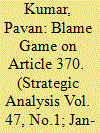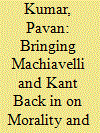| Srl | Item |
| 1 |
ID:
191585


|
|
|
|
|
| Summary/Abstract |
On 5 August 2019, India’s Prime Minister Narendra Modi took a bold decision and made drastic changes to Article 370 of the Indian Constitution, thus changing the legal status of the state of Jammu and Kashmir. This further sparked a debate over the real architect of the Article. There has been a lot of debate and discussion around Article 370. Article 370 provided a special status to the state of Jammu and Kashmir. The debate around Article 370 is highly political, biased, and targeted. It is either blaming Jawaharlal Nehru for the Article or proving that Vallabhbhai Patel was the real architect of the Article.Footnote1 This Essay goes beyond this narrow debate and looks into the available documents for a more authentic picture of the Article and Vallabhbhai Patel’s approach to it. The story of Article 370 follows the following trajectory.
|
|
|
|
|
|
|
|
|
|
|
|
|
|
|
|
| 2 |
ID:
167060


|
|
|
|
|
| Summary/Abstract |
This article is an attempt to understand the idea of morality in two of the most influential philosophers Niccolo Machiavelli (The Prince and Discourses) and Immanuel Kant (Perpetual Peace and Metaphysical Elements of Justice). Machiavelli and Kant are chosen because both of them are the most cherished philosophers in their fields. Machiavelli’s name is associated with realism, and he got a bad name because of his alleged cruel advice to maintain the state. His name is equalled with cunningness, murder, treachery. On the other hand, Kant is the founding figure of idealism in politics. His focus on categorical imperative and human capabilities to attain the higher moral goals made him one of the most well-known philosophers on idealism. To understand the ethical problems of the day emphasis is given to the classic writings of scholars who have written extensively on morality, justice, state, power, human rights and individual freedom. This article is an attempt to answer the following questions: Is the state in itself a highest moral actor? Can there be an individual morality above the state? What should be the yardstick to judge an act—the act in itself or the outcome of the act? What are the duties and rights of the individual in domestic society and can there be a similarity of morality at the level of political leaders in international politics? The paper argues that both Machiavelli and Kant were dealing with different contexts and societies, and morality for them had different meanings. However, the end justifies the means dictum is not the right way to understand Machiavelli on morality.
|
|
|
|
|
|
|
|
|
|
|
|
|
|
|
|
| 3 |
ID:
174177


|
|
|
|
|
| Summary/Abstract |
Through the concept of balancing as advocated by the Theory of Realism, Pavan Kumar analyses the current realities of the rise of China and its impact on India and Japan. After exploring the history of India–Japan relations from 1947 to 2014, he assesses the status of the friendship in the five years of the first Modi government through specific agreements, speeches and statements.
|
|
|
|
|
|
|
|
|
|
|
|
|
|
|
|